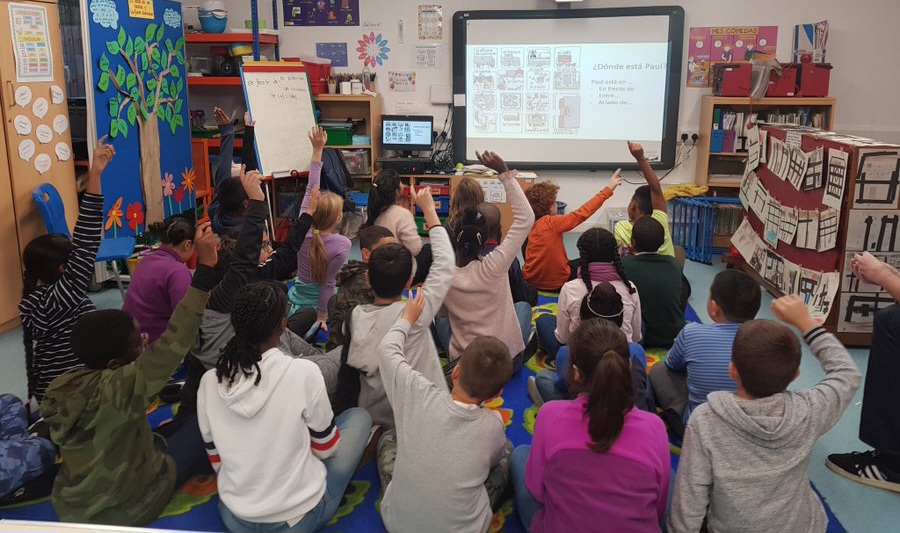For pupils
BBC Teach
Spanish language drama ‘La Poli’ is a ten part funny police detective story with clear clips which will enable students to expand and develop their listening, vocabulary, and pronunciation skills.
Suitable for KS3 Year 7 and KS2 Years 5 and 6
https://www.bbc.co.uk/teach/ks3-spanish/zjpg7nb
BBC Two – Sueños – World Spanish
Good clips about Spain and Hispanic world with brief introductions in English but then people talking about their work, lives, etc. in Spanish.
https://www.bbc.co.uk/programmes/b006w704/clips?page=2
BBC Two – Virtually There
A compilation of short, fun films and catchy songs for KS2 pupils learning Spanish.
https://www.bbc.co.uk/programmes/b03yzd0d/clips
BBC Bitesize KS2
Videos about life and culture in Spain, different topics, songs and stories.
https://www.bbc.co.uk/bitesize/subjects/zxsvr82
For teachers
Teachers TV
These videos are from Teachers TV – a DfE funded television and web channel which ceased to broadcast in 2011. They can now be found on YouTube
This are pre-2010 clips, but still very relevant today!
KS1/2 Modern Foreign Languages – Strategies and Pay-offs – Spanish to Year 6
How progression in grammar and literacy can be built into MFL
How can progression in grammar and literacy be built in to a school’s MFL strategy with the help of its LEA, and what is the wider value of teaching an MFL is at a Primary level? The example of Arnot Community Primary, Liverpool, a Centre of Excellence in MFL, with Spanish speakers on staff, and pupils learning Spanish from Foundation onwards is used here to help provide some answers. It examines what Arnot is achieving with children by Year 6, and explores the questions of what being a Centre of Excellence in MFL entails. As well as focusing on the numeracy work and games in Martin Fiztgerald’s Year 5-6 class, we hear from LEA Advisors Jayne Patten and Sheila Grady, Spanish Co-ordinator Teresa Miller, and Foreign Language Assistant Lucia Ábalos, as well as, crucially, the non-specialist teachers who are delivering the strategies in the classroom.
There are ideas here for Maths’ games, classroom language and how to progress from one word to sentence level work.
Teachers TV: Integrating Spanish Reception to Yr 3
Introducing Spanish to the KS1/2 Curriculum. Pupils from Reception to Year 3 learn greetings, names of animals and colours, days of the week, simple conversations and even basic number work through an inventive combination of toys, games, songs and stories.
This clip shows how the above can be taught by teachers and practised by pupils in a fun and engaging way.
Teachers TV: Speak to the World
‘Primary Languages’ visits St Michael’s Primary, Wolverhampton, to see their efforts in introducing a language to the curriculum.
The school has teamed up with its local secondary, Colton Hills Community School & Specialist Language College, who provide the support of language specialist, Patricia Whitbread.
As well as teaching the pupils, Patricia supports and teaches Monica Mason, the Year 3/4 class teacher, building her language skills in order for her to eventually take the class by herself.
This lesson on description of self, demonstrates how pupils learn vocabulary, sentences and grammar through actions and songs.
Teachers TV: Planning a Cross-Curricular Lesson in Spanish
A trainee teacher plans to integrate Spanish through PE.
This clip shows the imaginative use of a puppet in a Reception/yr 1/yr 2 class to teach colours and to then integrate that into a PE lesson.
¿Qué hice ayer? from the series ‘Primary Starters’
This is an authentic clip from Mexico with children involved in a game show in which they have to act out what they did yesterday, making use of the past tense. The clip is accompanied by sub-titles for the past tense sentences.
El Colàs from the series ‘Primary Starters’
This is a traditional song sung by Mexican children called ‘El Colàs’ and is accompanied by sub-titles. Teaching traditional songs to children in a foreign language helps to develop enjoyment in the language and comprehension skills, and also enhance cultural appreciation.
